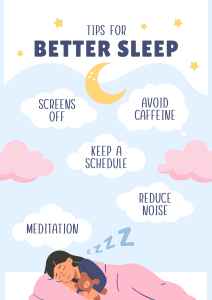Getting enough sleep is essential for a child’s growth, development, and overall well-being. However, many children struggle with sleep, whether it’s due to bedtime routines, stress, or simply a lack of understanding of the importance of sleep. In this blog post, we’ll explore the importance of sleep for children and provide tips for establishing better sleep habits.
Why is Sleep Important for Children?
Sleep is essential for a child’s growth and development, as it helps with:
- Physical growth and repair of tissues
- Mental and emotional well-being
- Cognitive function, including memory and learning
- Mood regulation and stress management
Tips for Better Sleep Habits

Here are some tips for helping your child establish better sleep habits:
- Create a consistent bedtime routine: A consistent bedtime routine can help your child feel calm and relaxed, and can also signal to their body that it’s time to wind down and get ready for sleep.
- Limit screen time before bedtime: Exposure to screens can disrupt a child’s circadian rhythm, making it difficult for them to fall asleep. Limit screen time before bedtime to help your child get a better night’s sleep.
- Establish a bedtime that works for your child: Some children may need more or less sleep than others, so it’s important to establish a bedtime that works for your child, based on their individual needs.
- Encourage a relaxing bedtime routine: Encourage your child to engage in a relaxing bedtime routine, such as reading a book or taking a warm bath, to help them wind down and get ready for sleep.
- Create a sleep-conducive environment: Create a sleep-conducive environment by keeping the bedroom cool, dark, and quiet, and by removing distractions such as toys or electronics.
Common Challenges to Overcoming Sleep Issues
Sleep issues can be the result of a variety of factors, including:
- Anxiety or stress
- Unfamiliar or uncomfortable sleeping arrangements
- Poor sleep habits or routines
- Physical discomfort or pain
Conclusion
Getting enough sleep is essential for a child’s growth, development, and overall well-being. By establishing a consistent bedtime routine, limiting screen time, establishing a bedtime that works for your child, encouraging a relaxing bedtime routine, and creating a sleep-conducive environment, you can help your child get the restful sleep they need. If your child is struggling with sleep issues, it’s important to address the underlying cause and work with your child to develop a solution that works for them.


